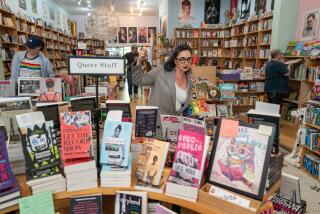Bookstores Seek New Chapter
CHICAGO — Adam Brent knew his 11-year run selling bestsellers and new releases was over when mail carriers started delivering books from Amazon.com to the tenants upstairs.
“Literally, they didn’t walk downstairs or take the time to make a phone call,” Brent said of Brent Books & Cards’ neighbors in Chicago’s business district.
Brent’s experience is shared by scores of independent bookstores around the nation that have been knocked out of business by huge chains such as Borders Group Inc. and Barnes & Noble Inc., massive retailers like Wal-Mart Stores Inc. and Internet sites like Amazon.com.
But Brent is also part of a growing number of independent bookstore owners refusing to give up. He’s closing his store this month but plans to reopen as a discount bookstore.
Others are luring customers by putting in cafes or opening specialty shops that cater to a specific audience, such as mystery lovers. Some are following the lead of public television and selling memberships. Or they’re being saved by investors who can’t bear the idea of losing these local institutions.
Not only that, but even as 200 to 300 independent bookstores close a year, the number of independents opening is creeping up.
“For a long time, from 1992 to 2002, you literally could count on two hands the number of openings,” said Oren Teicher, chief operating officer of the American Booksellers Assn. “In the last three years there are 60, 70, 80 stores opening” each year.
That’s welcome news for an association that has watched its membership plummet from 4,000 to about 1,800 since the early 1990s.
“There are a lot of ways to make money in the business,” said Brent, whose father, Chicago bookseller Stuart Brent, closed the city’s most famous bookstore after half a century in 1996.
Gary Kleiman, who owns BookBeat in the Northern California community of Fairfax, decided the way to do it was to get rid of the clutter and make his store a gathering place.
“We had 10,000 or 13,000 books in the store,” Kleiman said. “Now we have maybe 1,500.”
Last fall, Kleiman gave all but a handful of his used books to charity. Then he tore down shelves and in their place put tables and chairs and a small stage for live performances. He started offering free wireless Internet access. And to help persuade people to take advantage of it all, he got a beer and wine license.
As for the books, most of those left are new and they’re confined to the perimeter walls.
While he’s selling about the same number of books as he used to, new books are selling better. And his store has a lot more customers -- eating, drinking and listening to music -- than he did before. About 60% of the store’s profit comes from the cafe.
Some bookstores have survived by giving their customers what they say chain stores often do not: employees who know what they’re talking about.
“You can discuss books with us. We are all readers,” said Arlene Lynes, who opened Read Between the Lynes in Woodstock, Ill., in 2005. “To me, that’s what’s bringing people back.”
Some bookstores have benefited from their community ties.
Just this year, 14 investors got out their checkbooks and bought Brazos Bookstore in Houston, an institution for more than 30 years, after the owner announced he would close it or sell it to take another job.
“There was an uprising of people in the community saying, ‘We are not going to let this happen,’ ” said Jane Moser, the store’s manager, who said that when news of the original 14 spread, 11 more joined them.
In Menlo Park, Calif., community members also came forward with funding when Kepler’s Books closed in August 2005. Kepler’s reopened that October, thanks to more than $500,000 from 24 investors, and soon created a membership program.
About 2,000 people joined, pumping $196,000 more into the business, said Clark Kepler, whose father founded the store.
In the Bay Area, at least three other bookstores have implemented their own membership programs, said Hut Landon, executive director of the Northern California Independent Booksellers Assn.
Depending on the store and how much people give, they receive book bags, discount coupons and invitations to members-only author receptions.
Landon makes it clear, though, that it’s not gifts, coupons or special events that are prompting people to buy these memberships.
“It’s like with the symphony or a theater company in town,” he said. “You are joining but you are really donating. You are really doing it because you want that [store] to be part of the community.”
More to Read
Sign up for our Book Club newsletter
Get the latest news, events and more from the Los Angeles Times Book Club, and help us get L.A. reading and talking.
You may occasionally receive promotional content from the Los Angeles Times.








